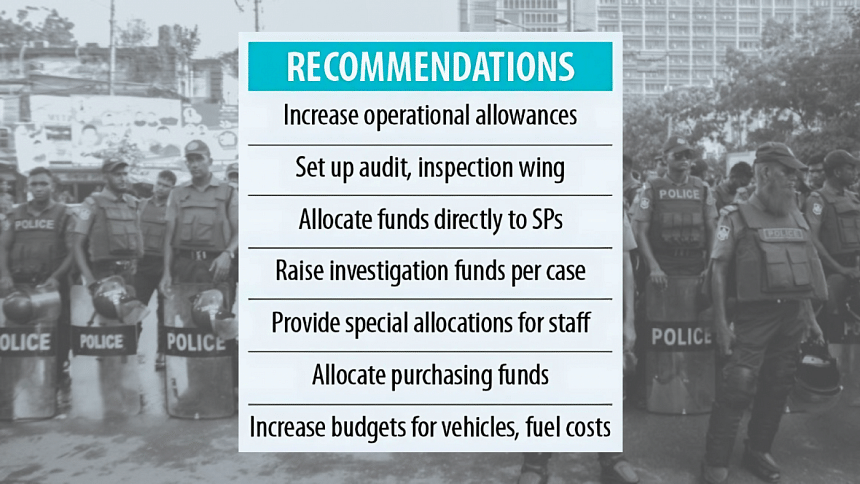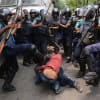Underfunding a key factor behind police bribery

When we talk about corruption in the police force, the focus, rightly so, often falls on bribery and abuse of power.
However, we rarely address the systemic issues -- such as inadequate allocations -- and how they create fertile ground for corruption and malpractice. From out-of-pocket expenses for investigations to dismal detainee meal allowances and insufficient fuel budgets, the shortfalls leave officers with no choice but to seek alternative -- and often unethical -- means to meet operational needs.
Now, a proposal by the Police Reform Commission aims to address these gaps by ensuring proper allocation for operational expenses.
Sub-inspectors and officers-in-charges from several Dhaka police stations say that without adequate and timely financial support, systemic issues will persist, forcing police to rely on questionable practices.
"We rarely have vehicles or funds to hire one when we need to travel outside the capital for critical cases like murder or robbery," said one SI, adding that operational expenses often fall directly on their shoulders.
"Hiring a vehicle alone can cost Tk 30,000–40,000," he said. "If the complainant is poor, we are left to manage the cost ourselves."
Then, they resort to alternative means, such as arresting innocent individuals and then extorting bribes for their release."
While the government provides some allowances—Tk 875 for daily expenses and Tk 15 per kilometre for travel outside duty stations—officers say these sums are far from sufficient to cover real-world demands.
CASE EXPENSES: INSUFFICIENT AND OUTDATED
Police are granted Tk 6,000 to investigate murder or robbery cases, Tk 5,000 for abduction cases, Tk 4,000 for unnatural deaths, and Tk 2,000 for theft or petty crimes. However, officers say these capped amounts rarely reflect the actual costs of gathering evidence, engaging informants, or making arrests.
An SI from Bhasantek Police Station said these constraints leave police financially vulnerable. "There are instances when I've spent Tk 40,000 from my own pocket just to apprehend a suspect," he said.
At a recent Dhaka Metropolitan Police crime conference, this issue was raised, with officers highlighting the strain it places on their ability to perform their duties effectively.
In response, DMP Commissioner SM Sazzat Ali directed that SIs could access vehicles through the motor transport wing. However, many officers argue this measure offers little relief due to procedural delays, particularly during nighttime when offices are closed. "By the time we get the vehicle, the suspect may already have fled," said another SI.
HIDDEN COSTS OF POILCING
OCs also pointed out the absence of funds for basic operational needs at police stations.
"There is no budget for cooks, cleaners, or electricians, all of whom are essential for running a station," said an officer who served as OC in three smaller stations.
He said that monthly out-of-pocket expenses for maintaining a station can range between Tk 80,000 and Tk 100,000, while source funds allocated to OCs amount to just Tk 20,000 in smaller stations and Tk 40,000 in larger ones.
"I had to hire a cook for Tk 15,000 per month, a cleaner for Tk 10,000, and an electrician or mechanic costs around Tk 1,200 per visit," he said.
Without proper allocations, some OCs resort to bribery or other corrupt practices to make ends meet, he admitted.
FUEL AND DETAINEE ALLOCATIONS: ANOTHER SHORTFALL
Fuel allowance is another contentious issue. Officers using official motorcycles receive 30 litres of fuel per month, while those using personal vehicles get just 20 litres. These amounts, officers argue, are woefully inadequate given the distances they must travel for investigations.
Meanwhile, detainee meal allocations remain dismal, at just Tk 75 per meal. Often, officers cover the costs themselves to avoid bureaucratic delays, particularly when detainees' families are unable to provide food.
"Submitting these expenses involves so much hassle that most officers simply avoid it," said a district superintendent of police.
CORRUPTION FUELED BY FINANCIAL GAPS
These financial gaps, coupled with an absence of oversight, create fertile ground for systemic corruption. When officers are left to fund operations out of pocket, they are incentivised to find alternative revenue streams, including bribes.
For instance, complainants are sometimes asked to bear investigation costs, or innocent individuals are detained and released in exchange for payments.
"Until these gaps are addressed and the police change their behaviour, true reform will remain elusive," said an OC who served in city police stations for over a decade.
RECOMMENDATIONS FOR REFORM
The Police Reform Commission has recommended several measures to address these challenges.
Among them are increasing operational allowances, establishing an audit and inspection wing to oversee procurement at police stations, and allocating funds directly to superintendents of police (SPs) to streamline expenses and reduce bureaucratic hurdles.
The proposals also include increasing investigation funds per case, providing special allocations for those working in the general diary section and verification-related departments, allocating funds for purchasing and repairing essential furniture in police stations, and increasing budgets for vehicles and fuel costs.
Without these reforms, the disconnect between police funding and operational needs will likely continue to hinder law enforcement, erode public trust, and perpetuate a system where corruption becomes a survival mechanism, said the cops involved.


 For all latest news, follow The Daily Star's Google News channel.
For all latest news, follow The Daily Star's Google News channel. 








Comments